

FETC 2014 - Orlando, FL. 2011 The Year of Open. The “open” space is expanding. 2011 has been a watershed year with open gaining traction and acceptance.
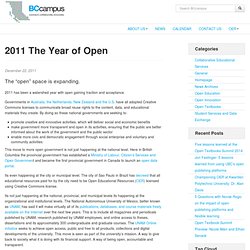
Governments in Australia, the Netherlands, New Zealand and the U.S. have all adopted Creative Commons licenses to communicate broad reuse rights to the content, data, and educational materials they create. By doing so these national governments are seeking to: promote creative and innovative activities, which will deliver social and economic benefitsmake government more transparent and open in its activities, ensuring that the public are better informed about the work of the government and the public sectorenable more civic and democratic engagement through social enterprise and voluntary and community activities This move to more open government is not just happening at the national level. Its even happening at the city or municipal level. 2011 The Year of Open. AIRCC Publishing Corporation. Teens, Social Media, and Privacy. Overview Teens are sharing more information about themselves on social media sites than they have in the past, but they are also taking a variety of technical and non-technical steps to manage the privacy of that information.
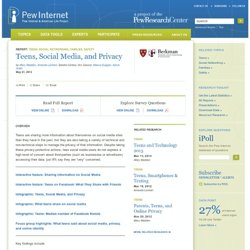
Despite taking these privacy-protective actions, teen social media users do not express a high level of concern about third-parties (such as businesses or advertisers) accessing their data; just 9% say they are “very” concerned. Interactive feature: Sharing Information on Social Media Interactive feature: Teens on Facebook: What They Share with Friends. Danah boyd. The below original text was the basis for Data & Society Founder and President danah boyd’s March 2018 SXSW Edu keynote,“What Hath We Wrought?”
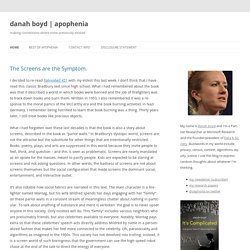
— Ed. Growing up, I took certain truths to be self evident. Democracy is good. War is bad. And of course, all men are created equal. My mother was a teacher who encouraged me to question everything. I loved pushing people’s buttons with these philosophical questions, but they weren’t nearly as existentially destabilizing as the moments in my life in which my experiences didn’t line up with frames that were sacred cows in my community. The funny thing about education is that we ask our students to challenge their assumptions. The funny thing about education is that we ask our students to challenge their assumptions.
For the last year, I’ve been struggling with media literacy. iSchool Initiative. Online enrollments in the USA grow 10% in 2011; OERs becoming accepted. Vol-955 - International Conference on Mobile and Contextual Learning 2012. ERB1204.pdf. 216083e. Social, Digital & Mobile Around The World (January 2014) Vol-955 - International Conference on Mobile and Contextual Learning 2012. M-learning. The term m-learning ("mobile learning"), has different meanings for different communities, covering a range of use scenarios including e-learning, educational technology and distance education, that focuses on learning with mobile devices.
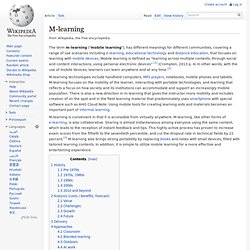
Mobile learning is defined as "learning across multiple contexts, through social and content interactions, using personal electronic devices” [1] (Crompton, 2013 p. 4) In other words, with the use of mobile devices, learners can learn anywhere and at any time.[2] M-learning technologies include handheld computers, MP3 players, notebooks, mobile phones and tablets. M-learning focuses on the mobility of the learner, interacting with portable technologies, and learning that reflects a focus on how society and its institutions can accommodate and support an increasingly mobile population.
M-learning is convenient in that it is accessible from virtually anywhere. M-learning, like other forms of e-learning, is also collaborative. History[edit] 1990s[edit] Mobile Learning Portal. This article reports on a recent report on an initiative at Longfield Academy in Kent, England.
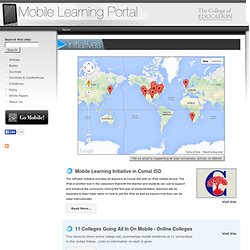
Longfield Academy in Kent, England is a recently built school covering years 7 through 13 (ages 11 to 18). At Longfield, they strive to provide a cutting edge learning experience incorporating a high level of technology integration in the curriculum. Over 800 students (the vast majority of students at the Academy) had or were issued iPads, across the full spectrum of grade levels (although not everyone had one, apparently a small percentage of students used other devices). The report’s Executive Summary concludes, “The outcomes at Longfield clearly demonstrate the value of the iPad as an educational tool.
" Among the key findings noted in the Executive Summary: The full report can be found here.